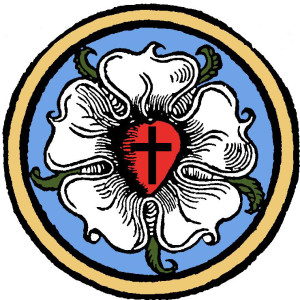
The Psalm for this Sunday is Psalm 1, describing how blessed the person is who who walks, stands, and sits in his life in the way and Word of the Lord. He is like a healthy tree, nourished and watered by the Lord and producing fruit. In contrast are the wicked, who sin and scoff and are like worthless chaff and will not stand in the day of judgment.
In the Old Testament lesson, Deuteronomy 30:15-20, the Lord also set before His people the way of life and good, and the way of death and evil. God has already called His chosen people and commanded them to love Him and walk in His ways and His commandments. If their hearts turn away, though, and they are drawn away to worship other gods and serve them, they shall surely perish. The way of life is rather in loving the Lord their God, obeying Him and His voice and holding fast to Him, for He is their life.
The Gospel lesson is from Luke 14:25-35. Jesus asks the crowds of people around Him to count the cost of following Him. He gives them “hard sayings” (John 6:60). Are they willing to “hate” everything else - in the sense of loving Jesus first and foremost, even it means “bearing crosses” on His behalf and renouncing all things and following Him to the “finish”? Are they willing to be “salt” (and “light”) to others and be “useful” for their Lord?
The Epistle lesson is a practical application of what the Gospel and other readings are talking about. Paul is in prison in Rome, suffering (bearing a cross) because he is a follower of Christ. Even there, he writes letters and is useful in encouraging fellow believers with the Word of God. He writes to Philemon, a Christian and a leader in the church in Colossi and sends back to him a runaway slave of his, Onesimus (whose name means “useful”) who has now become a Christian. Paul asks Philemon to treat Onesimus not as a slave, but as a “beloved brother” in Christ, and indirectly, is asking Philemon to consider freeing him and letting him return to Paul and the church in Rome, where he could be very “useful” for the Lord, in being spiritual “salt” and “light” to other people and “refresh people’s hearts in Christ.” What do you think Philemon did? What can you do to be “useful” as a Christian and be “salt” and “light’ to others? (See Matthew 5:13-16.)
More Episodes
 2023-07-24
2023-07-24
 17
17
 2023-07-20
2023-07-20
 8
8
 2023-07-20
2023-07-20
 5
5
 2023-07-12
2023-07-12
 8
8
 2023-07-12
2023-07-12
 8
8
 2023-07-04
2023-07-04
 8
8
 2023-07-04
2023-07-04
 11
11
 2023-06-29
2023-06-29
 7
7
 2023-06-21
2023-06-21
 6
6
 2023-06-21
2023-06-21
 10
10
 2023-06-14
2023-06-14
 8
8
 2023-06-14
2023-06-14
 11
11
 2023-06-07
2023-06-07
 10
10
 2023-06-07
2023-06-07
 11
11
 2023-06-07
2023-06-07
 13
13
 2023-06-07
2023-06-07
 9
9
 2023-05-31
2023-05-31
 12
12
Create your
podcast in
minutes
- Full-featured podcast site
- Unlimited storage and bandwidth
- Comprehensive podcast stats
- Distribute to Apple Podcasts, Spotify, and more
- Make money with your podcast
It is Free
- Privacy Policy
- Cookie Policy
- Terms of Use
- Consent Preferences
- Copyright © 2015-2024 Podbean.com






